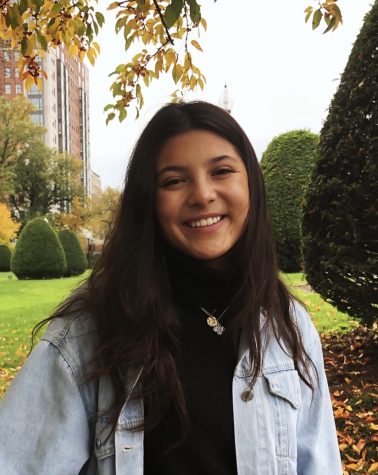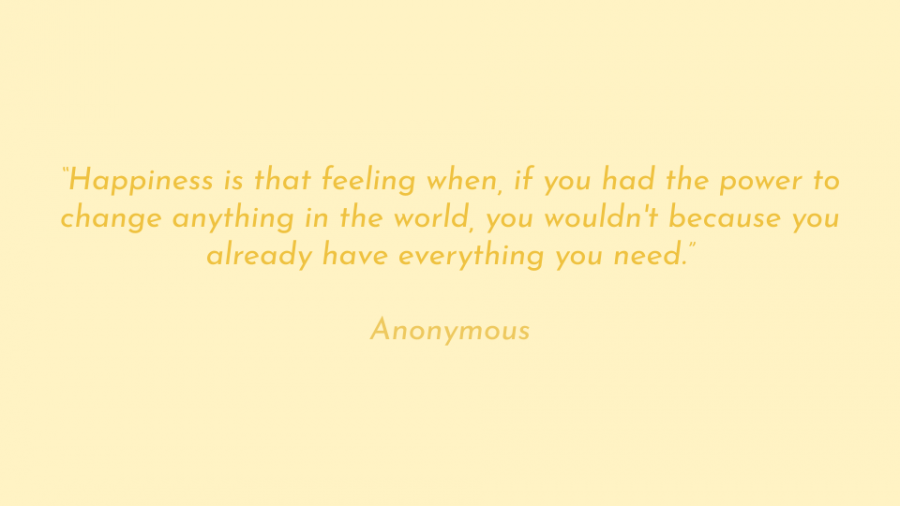What is happiness at Castilleja?
What is the secret to happiness? Humans have grappled with this question for hundreds of years, pining for the answer that would solve their problems. Starting all the way back in 450-300 B.C. with Plato and Aristotle, the secret to happiness was boiled down to an even simpler, yet much more complex question of “what is happiness?” For Plato, happiness was the highest aim of moral thought that could be achieved with the mastery of the cardinal virtues: temperance, fortitude, prudence, and justice. Aristotle believed that happiness was the goal of life, the only end or good that we desire for its own sake. Happiness was not just a feeling for Aristotle, it was a human activity that could be pursued through reason.
Now, over 2000 years later, the question of happiness continues to prompt some of our most avid and popular thinkers. Barack Obama, former president of the United States, in a speech in 2014, defined happiness as feeling as if you have been true to your beliefs and have lived with some integrity.
Over a span of over 2000 years, humans have developed, created, and discovered some of the most unbelievable things from the lightbulb to the harnessing and use of nuclear power, and yet we continuously contradict and debate one simple definition of happiness.
Now, there are so many different paths to go down in exploring happiness, and last year in I&S, I was assigned to define happiness for a presentation. Determined to find some sort of statement or idea that could be uncontradictable, I looked for a definition that was reasonable, mathematical, and rational. If I could say that 2+2 will always equal 4, couldn’t I devise a statement that would always, for everyone, define happiness? After all, for Plato and Aristotle, happiness was just that. If one could master the cardinal virtues or reason their way to developing only their “good morals”, that would undoubtedly yield happiness.
So, I created this definition of happiness that combined some sort of thought along the lines of “true happiness occurs when an expectation is low enough to be achievable, but not high enough that it could never be achieved, and reality supersedes that expectation.” But, immediately after giving this presentation, I asked myself “but is reality exceeding expectations really all that happiness is?”
After putting hours of work into concocting this perfect definition, the minute I presented it, I completely contradicted it. I realized that happiness couldn’t be like a math problem that could be solved. Like love, there is something much deeper, much more multidimensional, and much more personal to the definition of happiness. I continued to ponder my own conclusions, digging myself deeper into a philosophical hole for the rest of that month.
A little over a year later, true happiness feels like a rarity. In the midst of a global pandemic, an anything-but-seamless presidential election, and an increasingly polarized nation, happy is not one of the first adjectives that come to mind when thinking of the 2021 American. A couple of weeks ago, my advisory had a thought-provoking conversation about happiness. After a year of the dust settling from my previous struggle with the definition of happiness, happiness was again all I could think about. I wanted to revisit and develop my own definition of happiness, but I wanted to approach it in a completely different way. Instead of contriving some objective and mathematical overarching statement, I really wanted to focus on people, on stories, and on the contradictions that made this defining so impossible.
I started with two of the most influential adults in my own life who have different stories. For Mr. Barriger, my advisor, happiness was a state of mind that you could only sustain if you feed it through social connections and paying attention to your own physical state of mind. He explained you have to be committed to working towards that state of mind that is happiness, questioning yourself on what you do day to day or the people you interact with, asking, “do these feed me?” To feed this state of mind, Mr. Barriger takes care of his physical health through his passion for running, and mental health through writing and journaling.
After speaking with Ms. Hansen, I learned that for her, happiness was also a state like Mr. Barriger, but one that fluctuates without influence. When talking about her own journey in finding happiness, Ms. Hansen said, “Striving for happiness is like trying to catch smoke.” Reflecting upon her journey, Ms. Hansen highlighted the key idea that clinging onto things can cause distress, and part of learning your own happiness is being open to what comes.
Both Mr. Barriger and Ms. Hansen had different answers to my question of what is happiness, but neither were wrong nor were they right. They were different. They were personal. They were truthful. Just from two short, honest conversations, I learned happiness is not rational, or mathematical, or concrete. Like smoke, it’s elusive, but it’s also a wonderful truth that each individual grows to explore and discover in themselves. The best definition I can now make is that happiness is defined by you.
Happiness has been a struggle for my fellow juniors as we start to navigate our path to college applications while tackling difficult classes and juggling a plethora of extracurriculars. I’m sure you might have heard of the infamous junior year crying photo albums that have almost become a tradition. In other words, sometimes life sucks. Defining your own happiness is really hard, much less remembering to notice what does in fact make us happy in our day-to-day lives. So, in this time of stress, anxiety, and (our favorite word of the past year) uncertainty, I wanted to share with you all, my closest friends and the community that is like a second family, what is happiness around the Casti Circle. I hope this brings a smile to your face.
If you would like to see the rest of the submitted responses, check out this doc!

Anja Peterson '22 is the Editor of Arts and Entertainment. Besides writing for Counterpoint, she loves playing soccer and loves musical theatre. Anja would...


